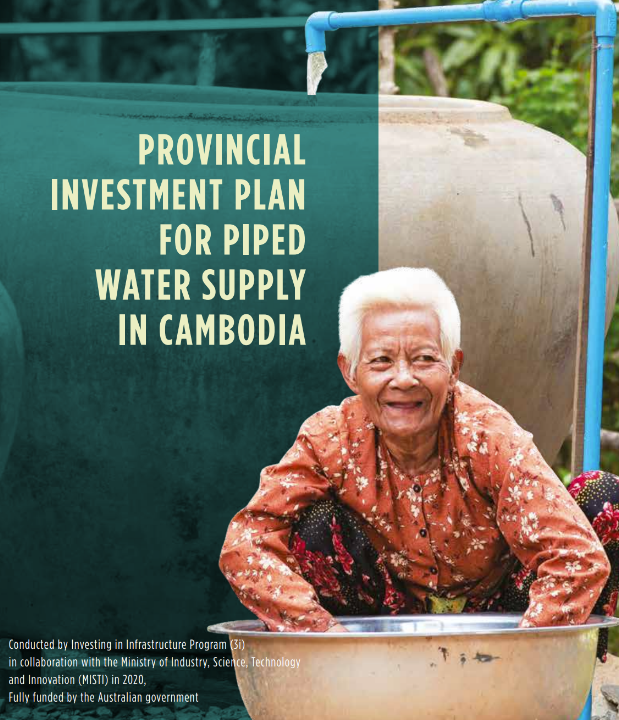CAPRED seeks to engage a consulting firm to develop and deliver a training program and accompanying tools on Social and Behaviour Change Communications (SBCC) for its staff.

The development of public infrastructure – including transport, energy, water, communications and sanitation – plays a crucial role in stimulating resilient, inclusive and sustainable economic growth. To continue current levels of growth, Cambodia is estimated to require infrastructure investments of US$28–30 billion between 2016 and 2040.
Private sector investment can help bridge this gap and will become more important as Cambodia moves to upper middle-income status. The Royal Government of Cambodia is encouraging this through a strong regulatory framework (the 2021 Law on Investment and the 2021 Law on Public–Private Partnerships).
CAPRED focuses on strengthening the private sector’s role in piped water, variable renewable energy and energy efficiency investment. CAPRED will also explore other infrastructure financing, such as deal flow, public–private partnerships and green infrastructure bonds.
.png)
Piped, treated water is the gold standard for sustainable access to clean water. Immediate in-home access is especially beneficial for women, people living below the poverty line, and people with disability. While urban coverage is 70%, only 47% of the total population can access piped water (2020). An estimated investment of at least US$264 million is needed to cover the remaining villages.
Australia’s former infrastructure program, 3i: Investing in Infrastructure, implemented 80 viability gap financing investments for water projects in Cambodia. This supplied water to more than 253,000 households. Viability gap financing mobilised private sector investments of approximately US$16 million (or 55% of total investment costs).
Without viability gap financing, these households would not have access to clean, piped water. Monthly water consumption has since doubled from 5 to 12 cubic metres, particularly among households that previously accessed water through truck delivery.
CAPRED is working on other financing options such as the Water Development Fund. We are also helping the Royal Government of Cambodia on regulatory, monitoring and enforcement capacity; testing new business models; providing technical support to private water operators; and working to encourage more youth participation in the sector.
.png)
Only 7.8% of Cambodia’s energy is variable renewable energy (VRE) – all photovoltaic solar. VRE is the future of energy supply. It is cleaner and cheaper than alternatives. Prices of solar and wind generation are now lower than even the cheapest coal projects.
High energy costs are one of the biggest barriers to Cambodia’s agro-processing competitiveness and exports. Allowing agro-processors to install more VRE would attract investment and drive employment and income generation along the agricultural value chain.
The VRE sector has become crowded with major investors and development partners. As such, CAPRED works closely with the Royal Government of Cambodia to identify strategic niche areas and targeted supported needed for the country to absorb more VRE.
CAPRED will support Cambodia’s capacity to manage more VRE in the energy mix and develop an investment-friendly regulatory framework. The program will support the Ministry of Mines and Energy, Electricity Authority of Cambodia and Electricite du Cambodge to explore modern technologies for VRE integration and support the revision of grid monitoring and control systems.
.png)
The Royal Government of Cambodia’s Power Development Plan estimates that up to 17% of the country’s increased energy demand will need to be met through energy-efficient measures. By 2030, the goal is to save 1,215 megawatts, or about one-third of current supply.
Other countries have markets for Energy Service Companies (ESCOs) that invest in energy efficiency for industrial facilities. ESCOs provide the investment capital, and the “energy dividend” pays back the loan. There is currently no ESCOs market in Cambodia.
CAPRED will pilot potential investment models between ESCOs and businesses, starting with agro-processing facilities, where energy costs are high.
Electric vehicles can also significantly reduce carbon emissions. While electric vehicle transition principally benefits those who are wealthy, CAPRED will monitor government policy and look for entry points for investment in electric transportation.
See our latest resources from across the CAPRED program.
View more
This publication has been funded by the Australian Government through the Department of Foreign Affairs and Trade.
Cambodia has ambitious renewable energy plans, which includes 70 per cent of its energy coming from renewable sources by 2030. Australia is committed to working with Cambodia to support its clean energy transition and meet its goals. Recently, Australia supported a delegation to visit Australia to learn about our experience in integrating variable renewable energy. We spoke with Dr Darith, Deputy Chief of the National Control Center at Electricité du Cambodge, who was part of the delegation to hear about his experience. Check out what he had to say about the visit.
Small and medium-sized enterprises (SMEs) account for 70% of jobs in Cambodia. However, only about 13% are formalised, hindering productivity, access to finance and markets, and government support. Australia, through the CAPRED program, collaborated with the Ministry of Industry, Science, Technology & Innovation (MISTI) to develop a digital public service portal for SMEs, handicrafts and industry to apply for licenses. This platform helps foster business formalisation, improve enterprise capacity and productivity, and promote economic growth and increased foreign direct investment. To ensure the online platform’s applicability and usability, CAPRED and MISTI conducted a Consultation and User Testing workshop with representatives from SMEs, handicrafts, and industries. The resulting inputs and feedback were integrated into the platform’s development ahead of the June 2024 launch. Check out the workshop video to learn more.


Provincial Investment Plan for Piped Water Supply...


Australia Invests in Cambodian Engineers for a Gre...


Australia Workshops Cambodian Enterprises on New D...
Read our latest news & stories to find out more about CAPRED’s interventions.
View more